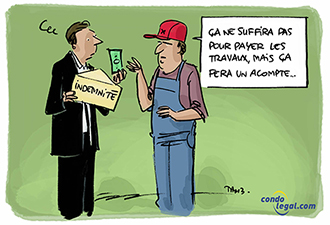Publication date: 13/11/2024
In a recent judgment, the Quebec Court rejected the request of an association of co-owners who asked a co-owner to repay the deductible of $50,014.13, after water damage occurred in his unit in April 2021. judgement highlights some recurring questions regarding the liability of co-owners and the joint burden of proof in property damage disputes.
Case Background:
A brand new co-owner asks service providers to do a little work on his unit, before moving into the property. However, while one of these service providers was carrying out work, including removing the existing wallpaper, an explosive device was set off , causing extensive water damage, both in this co-owner’s unit and in the common areas of the building.
The union, having itself accepted the amount of the deductible in the claim to its insurer, wants this deductible to be paid back from the co-owner, claiming that his responsibility, due to the fault of his service provider. It is primarily based on a provision in the co-ownership declaration which is as follows.
“Each co-owner remains liable to the other co-owners and to the union, for the harmful effects caused by his fault or negligence and by his employees or by the premises for which he is responsible until legal. »
Key points of the review:
- Absence of direct proof of fault: The Court first noted that the union did not provide direct evidence or experience proving that the use of a wallpaper stripper caused the activation of the sprinkler. So he must proceed with forethought. However, to accept the suspicion of liability, the union had to show, through real facts, detailed and consistent, that the use of this device caused the incident. The judge says that presumptive proof cannot be merely presumptive; it must be based on established facts that lead directly and necessarily to the desired conclusion. Having failed to provide such precise and consistent facts, this element was decisive in rejecting the request.
- Liability depending on the relationship between the co-owner and his service provider: The Court also examined the nature of the relationship between the co-owner and the service provider retained to perform this one-time job. However, he was an independent worker, without any relationship with the union, and the relationship was based on a service contract. The court decided that he was not therefore an employee, according to the meaning of the article 1463 from Civil Code of Quebecbut from an independent service provider. Therefore the co-owner could not be held responsible for the actions of the latter.
- Implementation of article 1074.2 of Civil Code of Quebec and conditions for proof of joint ownership: The incident took place in April 2021, the judge is investigating the article 1074.2 CCQ (version 2) and confirms that the provision of the co-ownership declaration on which the syndicate is based partially reduces from the first paragraph of this article. The provision of proof of joint ownership is therefore deemed to be unwritten. The judge therefore decided that the union had to prove that the co-owner had committed a fault which was the cause of the damage, or that this damage caused to him was the result of the property or the fault of a person to the it was legal. responsible, in this case the service provider booked to do the work, on the day of the event. Having failed in such a demonstration, the union did not win its case.
Our recommendations:
This judgment offers a number of practical lessons for co-owner associations that want to ensure strict management of events involving co-owners and protect themselves from similar situations:
- Establish a policy for managing work in private areas: The union should formalize a written and clear procedure for all co-owners who wish to work in their units, specifying each type of work that requires permission, the documents to be provided (plans, quotes, insurance), and the mandatory inspections.
- Call a claim adjuster: When a claim occurs, seek professional expertise to determine the exact cause of the incident. This proof can be provided by building experts or specialized engineers and is often decisive in establishing the source of the loss and the resulting liability.
- Monitoring the interventions of service providers in private and common areas: To avoid disputes, the union should follow the procedures to be followed by co-owners who want to use service providers in their unit, with to want for example in its internal rules. licensing and insurance, and prohibits specific interventions near sensitive systems, such as sprinklers.
Conclusion: This judgment underlines the importance of co-owner associations following strict procedures and strictly documenting interventions in private areas. Proof of fault is essential to recovering valuables from co-owners, and proactive and proactive management can help reduce the risks of future litigation.
Reference: New Europa joint ownership association c. Minneci (2024 QCCQ 5903)
2024-11-14 01:37:00
#Insurance #deductible #proof #union #provide #refund #CondoLegal.com


